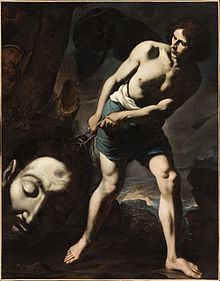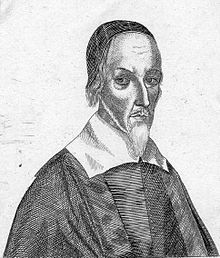Katherine Chidley
Initially involved in resistance to episcopal authority and in separatist activity in Shrewsbury and London, she emerged during the English Civil War as a powerful advocate of an Independent or Congregationalist polity.
The baptism of the first child, Samuel, described as the son of "Daniell Chedler" was recorded in the parish register of St Chad's Church, Shrewsbury on 13 April 1618:[2] the spelling of the surname is very varied.
However, he was cited for allowing meetings to hear sermons and sing hymns in his home on Sunday evenings, and it is known that these were centred on Julines Herring, the town's public preacher, of whom the Wrights were key supporters.
Herring himself considered the Chidleys separatists and his biographer, Samuel Clarke reports that: "When some seeds of separation were scattered in Salop (by Daniel Childey and his wife,) their growth was checked by his appearing against them.
"[11] Herring's criticism of them is reported as: It is a sin of an high nature to unchurch a Nation at once, and that this would become the spring of many other fearful errours, for separation will eat like a Gangrene into the heart of Godlinesse.
[10] David Brown, a founder member of the group, implies that they tore a surplice as a deliberate act of iconoclasm one St Luke's Day (18 October) at Greenwich.
[20] Katherine's own views were made public for the first time in October 1641, just less than a year into the Long Parliament, which Charles I was forced to call because of his disastrous handling of the Scottish Presbyterians, culminating in the Bishops' Wars.
[24]Chidley asked for the reader's indulgence, as she knew she did not have the education and experience of the formidable Edwards: But though these my Answers are not laid downe in a Schollerlik way, but by the plaine truth of holy Scripture; yet I beseech thee have the patience to take the paynes to reade them, and spare some time to consider them...[25]However, the Biblical quotations she chose were for the title page were highly provocative.
"[29] Later in the book she listed the ways in which the Episcopalian clergy exploited the poor, including one which refers to the fee extracted for the churching of women, which she had boycotted in Shrewsbury.
The onset of the English Civil War forced the House of Commons of England on 6 September 1642 to pledge the abolition of episcopacy and unification with the Church of Scotland,[38] although the practical working out of such a scheme was remitted to the Westminster Assembly of Divines.
However, series of disasters for the Parliamentarians during 1643 forced acceptance of the Solemn League and Covenant, sworn by both Houses of Parliament on 22 September,[39] committing England to a Presbyterian polity headed by the king.
We have seene also by our own experience in this intermysticall season (though there hath been no formall Toleration) yet for want of Government setled, and people having been left to so great libertie, multitudes are fallen, and doe daily to Antinomianisme, Anabaptisme, Independencie, yea to denie the Immortalitie of the Soule, and then no expectation but many will fall more and more: Independents and all kinde of Sectaries (as long as they can have their libertie) snuffe up the wind, will not hearken to any way whereby they may receive satisfaction, but if once the Magistrate declares, and by laws concludes one way of Church-worship and Government, then it may be they will heare Reason...[41]Chidley observed that to answer Edwards was "a taske most befitting a woman.
"[47] On the crucial question of setting up elected presbyteries in churches, the Commons voted in the affirmative on 6 January and resolved to inform the Scots of the decision.
[48] Chidley was clearly very active in this period, as Robert Baillie, one of the Scottish representatives to the Westminster Assembly, deploring the appearance of female preachers, noted her at work: ...none of the Independents, either in New England or Holland, neither the Brownists of Amsterdam, did ever give unto any women any publike Ecclesiastick power.
In this, our London Independents exceed all their Brethren, who of late begin to give unto women power of debating in the face of the Congregation, and of determining Ecclesiastick causes by their suffrages, if Doctor Bastwick be rightly informed.
24:27.Despite widespread discontent among Independents, particularly in the Parliamentarian army, Parliament decided in June 1646 to press ahead with a Presbyterian reorganisation of the Church of England.
[11] Edwards portrays Chidley as bitterly sectarian, narrating an incident he claimed had taken place at Stepney Meeting House, where the moderate Independent William Greenhill was pastor.
Katherine Chidley about August last came to Stepney, (where shee hath drawn away some persons to Brownisme) and was with Mr. Greenhill, where shee with a great deal of violence and bitternesse spake against all Ministers and people that meet in our Churches, and in places where any idolatrous services have been performed: Mr. Greenhill answered her by Scripture, and laboured to reduce to a short head all she had spoke, asking her if this were not the sum, namely, that it was unlawfull to worship God in a place which had been used or set apart to Idolatry, under the Names of Saints and Angels; she would not hold to the stating of the question, but running out, Mr. Greenhill to convince her, told her that all England in this way and manner had been set apart to St. George, and Scotland to Saint Andrew, and so other Kingdomes to other Saints; so that by her grounds it was unlawfull to worship God in these, and so by consequence anywhere in the world; but instead of being satisfied or giving any answer, shee was so talkative and clamorous, wearying him with her words, that he was glad to goe away, and so left her.
[55]Edwards went on to relate the activities of Chidley and her son Samuel in Bury St Edmunds: a passage in which he described her as "brasen-faced audacious old woman resembled unto Jael,"[54] apparently using a comparison she had herself put into circulation, although presumably with a different valuation.
Thomas Edwards testifies in the later part of Gangraena, compiled that year from readers' reports, that There is one Katherine Chidly an old Brownist, and her sonne a young Brownist, a pragmaticall fellow, who not content with spreading their poyson in and about London goe down into the Country to gather people to them, and among other places have been this Summer at Bury in Suffolke to set up and gather a Church there...[54]The mission is known also from the extant covenant made by the church they helped found in Bury St Edmunds.
The covenant is radically separatist: and [wee] being conuinced in conscience of the evill of ye Church of England, and of all other states wch are contrary to Christs institution.
Presbyterian reorganisation was even more patchy in the rest of the country than in London and another ordinance was passed in January 1648, with the aim of removing obstructions to the process.
[61] The irascible Edwards had been forced to leave the country during late summer 1647 and surfaced in the Dutch Republic as a member of the English Reformed Church, Amsterdam: he died there on 7 February 1648.
[62] The Second English Civil War, with the abortive invasion of the country by a Scottish army in support of the king, resulted in the final collapse of the attempt to construct a Presbyterian system and the triumph of toleration for the Independents.
On 29 April 1649 the English Council of State committed to prison the Leveller leaders John Lilburne, Richard Overton, William Walwyn and Thomas Prince, who owned a book critical of the regime, England's New Chains.
[73]This patronising answer seems to have provoked their Humble Petition of divers well-affected women of the Cities of London and Westminster, presented on 5 May 1649,[71] which may have been written by Chidley.
[74] The Leveller women justified their political activity on the basis of "our creation in the image of God, and of an interest in Christ equal unto men, as also of a proportional share in the freedoms of this Commonwealth.
Public pressure was probably secured the freedom of the four, as they were not released immediately after acquittal.When John Lilburne found himself on trial again in 1653, Chidley rallied to his defence, organizing a petition to Barebone's Parliament.
Chidley was famous or notorious enough in her own day for important Puritan controversialists like Edwards and Goodwin to take note, although it is arguable that her full significance was overlooked.
He also knew the report of the Stepney encounter with Greenhill, from the first part of Gangraena, but apparently not the narrative of the Suffolk mission, or anything of her Leveller connections, as he concludes: "Whether she wrote any thing more, or what became of her afterwards, I know not.







